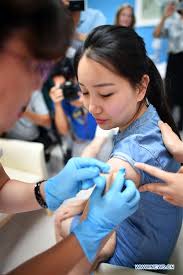Chinese vaccine for HPV approved

Beijing: China has approved its first domestically made vaccine against the cancer-causing human papillomavirus for use by females aged 9 to 45, providing an alternative to foreign drugmakers’ products, according to the National Medical Products Administration.
The newly approved vaccine is designed to protect against Type 16 and Type 18 HPV, the two most common virus strains that lead to cervical cancer, the administration said in a notice released on Tuesday.
Worldwide, only two pharmaceutical companies are able to produce HPV vaccines-Glaxo-SmithKline, headquartered in the United Kingdom, which makes a two-valent HPV vaccine, and United States’ company Merck & Co, which produces four-valent and nine-valent vaccines that protect against a wider range of HPV strains. A nine-valent vaccine can protect against nine types of HPV.
As of April 2018, they had all gained approval for commercial release in China, but some consumers had complained about a shortage of vaccines due to a sudden surge in demand following their approval in the country.
The administration said the green light granted to the domestically developed vaccine was intended to meet public demand, China Economic Net reported.
The new vaccine, known as Cecolin, was jointly developed by INNOVAX, a biotechnology company based in Xiamen, Fujian province, in cooperation with Xiamen University.
The company said more than 7,300 females across five provincial-level regions took part in the vaccine’s third-stage clinical trial in China’s four-tier drug approval system.
During the trial, the vaccine was able to provide protection against precancerous lesions related to HPV for all recipients and protection against persistent HPV infection for 97.8 percent of them, while demonstrating its safety.
The results put the two-valent vaccine on a par with the imported types in terms of its efficacy and safety, making it a world-leading vaccine product, the company said.
While most HPV vaccines are administered as a three-dose injection, the new vaccine will require only two doses for a full vaccination procedure.
The company added that it will accelerate efforts to submit applications for World Health Organization prequalification, which examines the capacity and quality of a manufacturer, in order to expand the reach of the Chinese-made HPV vaccine and step up the global fight against cervical cancer.
Zhang Jun, deputy dean of Xiamen University’s School of Public Health, told the online news website Jiemian.com that the domestic HPV vaccine was made using E. coli bacteria, which will cut production costs compared with its foreign counterparts and boost manufacturers’ production capacity.
China accounts for about 28 percent of the approximately 500,000 new cervical cancer cases around the world each year, according to the National Cancer Center.





